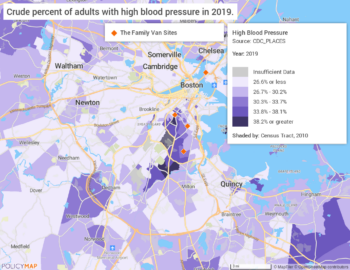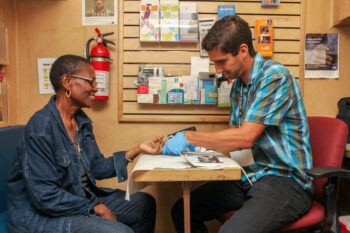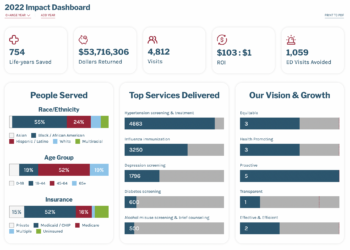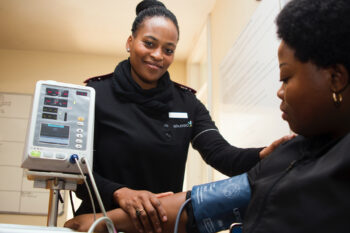What's Happening
- All
- Take Action
Join us July 18, 2024 for the Evaluation + Impact Special Interest Group Meeting
Beyond Numbers: The Power of Qualitative Data in Mobile Clinic Impact Narratives. Highlighting the crucial role of qualitative data in capturing the full impact of mobile clinics. This session will explore how personal stories, interviews, and patient experiences offer deeper insights and a richer context to healthcare outcomes. Participants will learn techniques and best practices to effectively use qualitative data for storytelling, creating reports, and communicating impact. 07/18/2402:00 PM-03:00 PMVirtual REGISTER TODAY!
Upcoming Webinar: Visualizing Impact: Leveraging Data Visualization for Program Evaluation
Mobile Health Map is proud to co-host the Evaluation + Impact Special Interest Group with the Mobile Healthcare Association. We aim to help mobile health clinics make a greater impact in their community, strengthen their programs long-term, and increase awareness about the important role mobile health programs play in the healthcare system. During quarterly meetings, participants will have opportunities to learn from peers and hear from experts in evaluation and community impact. Date: Thursday, April 25 Time: 1:00-2:00 PM ET Speaker: Jess Cohen-Tanugi, Visualization Specialist, Harvard Faculty of Arts and Science. Get started with data visualization strategies to demonstrate and communicate the successes and impact of your mobile health clinic. Register Now. It's Free!
Mapping trends: How mobile clinics spot emerging issues in public health, from major U.S. cities to America’s rural towns
By Mollie Williams, DrPH, MPH, Harvard Medical School Public health crises like the recent COVID-19 pandemic underscore the importance of identifying emerging health issues and responding quickly to them. In many communities, mobile clinics serve as the eyes and ears of the healthcare system, and more than 1,000 of these clinics share their latest information with us. By analyzing data provided by these care providers in the field, we can better understand how mobile clinics play a role in addressing challenges with speed and agility. Here are the four top issues we’re watching right now: Diabetes, Obesity and Access Ozempic, Wegovy, and other new diabetes medications are being celebrated in the news and on social media for their potential to lower America’s obesity rate. But for the uninsured, obesity and diabetes continue to pack a life-threatening one-two punch. Access to insulin – a medication that people with more advanced Type 2 diabetes need to stay alive – remains a financial challenge for many, in spite of some state-mandated price caps and drug companies’ price cuts. New data from our impact tracker shows that obesity-related screening and counseling is the second most common service provided by mobile clinics. Many clinics also screen for diabetes with the goal of identifying people who don’t know they have the condition. For example, The Family Van, a mobile clinic in Boston, reports that 41% of their clients had higher than normal blood sugar levels despite having never been diagnosed with diabetes. Evolving Substance Use Crisis Xylazine, a sedative used by veterinarians that’s increasingly found in street drugs, is often mixed with fentanyl and can cause severe skin ulcers and infections. Mobile clinics have been on the front lines of treating xylazine-impacted clients and are responding by adding behavioral healthcare and wound care to their services. In fact, over the last three years, the number of mobile clinics providing behavioral healthcare services has tripled. The staff on La Movil, a mobile clinic operated by Intercambios Puerto Rico, cares for hundreds of people each year who are affected my homelessness, substance use, and mental health challenges. Dr. Elisa ...
Sign up for Mobile Health Map to evaluate your impact and increase your mobile clinic’s visibility
Are you a mobile healthcare provider looking for an easy way to evaluate your impact, share it with stakeholders, and increase your visibility? If so, our free and confidential tools can help. With Mobile Health Map, it’s easier than ever to add your clinic to our map and create a personalized dashboard. Let’s look at how our platform helps you show people the difference you are making! Easy-to-use digital tools to evaluate your impact We understand that your time is limited and valuable, which is why we have developed a user-friendly platform that makes adding your mobile clinic to the map easy. With just a few clicks, you will be able to input all necessary information about your location, services provided, contact information, and more. You will also be able to create a personalized dashboard to evaluate your impact and answer the following questions: Who do you serve? What are your most popular services? What is the economic impact of your preventive services? How does your mobile clinic meet public health quality standards? Secure and confidential data storage Our platform is secure and private. We understand that data security is of utmost importance to you; this is why we take steps to ensure all data related to registered clinics is safeguarded from unauthorized access. We do not collect individual patient data and we will never share your clinic's aggregate data in an identifiable way. Your listing on the map includes your location, community type (e.g. rural, urban), types of care delivered (e.g. primary care, dental), and funding sources (e.g. philanthropy, insurance). We do not share your clinic's specific service information such as number of people served or operating costs. Benefits of mapping Your location There are many reasons to add your mobile clinic to the map. For starters, you will be easily found by people searching for healthcare providers in their area. Additionally, this will increase visibility for your organization as well as draw attention from local government organizations or other entities looking for ways to provide better access to health care services in underserved areas or communities with limited ...
Join us at the 2023 Annual Rural Health Conference
Download the slides Please join us at the largest meeting of rural health experts and advocates, May 16 - 19, 2023 in San Diego. Our Executive Director, Mollie Williams, will share new data about the impact of mobile clinics in rural communities. Mobile clinics deliver high-value care in rural communities Mobile health care has grown exponentially over the past three years as providers sought creative ways to deliver COVID-related services while continuing to meet communities’ ongoing healthcare needs. As the field of mobile health continues to evolve, it is important to understand the unique aspects of rural mobile health and how providers can sustain efforts that began as a response to COVID-19 and now have the opportunity to adapt and meet other rural health needs. What we already know about mobile healthcare Mobile health programs have been shown to be effective in the management of chronic diseases, such as asthma and hypertension, as well as in the improvement of self-efficacy and participation in recommended preventive screenings. Increasingly, health care providers are delivering behavioral health, harm reduction, and crisis intervention services using mobile health units. Some organizations also couple mobile health care with telemedicine to expand access to specialists while overcoming the digital divide. New data about the impact of rural mobile clinics We will share a new analysis of rural mobile clinics across the United States including who they reach and the services they provide, including immunizations, blood pressure screening, and mammography. Using Dr. Nancy Oriol's algorithm to estimate the economic benefit of mobile clinics, we will present how mobile clinics save lives, reduce healthcare costs, and provide economic benefit to communities. Let's connect! We hope to see you at our session on Thursday, May 18, 2023, 3:30 – 4:45 pm. If you are unable to attend the conference, and want to talk about opportunities to advance rural health, please reach out. We must continue to invest in the capacity mobile providers to adapt and sustain their efforts to meet the changing needs of communities.
REPORT: How mobile clinics lower costs and generate revenue for health care organizations
How do mobile clinics reduce costs? The COVID-19 pandemic has sparked innovation in health care delivery, including new and expanded use of mobile clinics. In addition, the pandemic has raised awareness about long-standing disparities and the need for community-based solutions to advance health equity. There is strong evidence that mobile clinics improve health outcomes and reduce costs to the health care system and to society-at-large. Likewise, we need to understand how mobile clinics reduce costs and align with health care organizations’ financial incentives. Business pressures shape decisions about community programs In this report, we explore how mobile clinics support the business objectives of health care organizations. By understanding how health care leaders view mobile health programs and their impact on the organization’s bottom line, mobile clinics can sustain or expand their efforts to deliver health care to underserved communities. We conducted semi-structured key informant interviews with 25 health care leaders to explore their views and experiences related to mobile health care. Subsequently, we used thematic analysis to identify patterns and create a conceptual framework. An advisory group with expertise in mobile health, health management, and health care finance informed data collection and analysis. New framework for equity and impact Health care leaders described multiple ways mobile clinics bolster business objectives of health care organizations. For example, many discussed the impact of mobile clinics on organizational culture, business strategy, budget, and health equity. With this in mind, we present a conceptual framework that demonstrates how these factors, supported by community engagement and data, come together to form a business case for mobile health care. The report provides a timely, in-depth look into mobile clinics. Furthermore, it helps us understand how they advance health while reconciling the business pressures that health care organizations face. Download the full report or an executive summary. Download the full report or executive summary to read how mobile clinics do the following: Bridge gaps in access to quality care Build trust with marginalized communities Attract, inspire, and retain healthcare talent Create new business opportunities Encourage innovation and community engagement Why does this report matter? The COVID-19 pandemic ...







